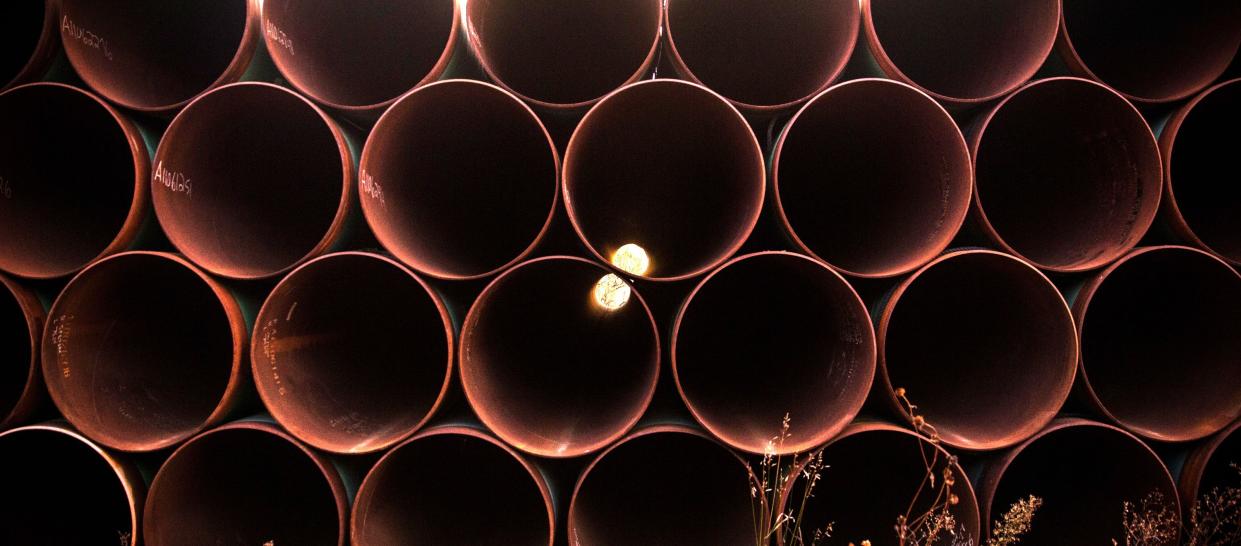Canada to Sell Pipeline Stake to Indigenous Groups Through Special Vehicle

(Bloomberg) -- Canada plans to sell a stake in the Trans Mountain oil pipeline to individual indigenous communities through a special-purpose vehicle, allowing the government to balance competing groups’ requests to own a piece of the controversial project.
Most Read from Bloomberg
Retirees Face $17,400 Cut to Social Security Benefits in 2033
Ecuador Presidential Candidate Assassinated, Suspect Shot Dead
First American City to Tame Inflation Owes Its Success to Affordable Housing
Once Asia's Richest Woman, China Property Tycoon Loses More Wealth Than Any Billionaire
The groups will be provided with access to capital so they don’t have to risk their own money to participate, according to a letter from Deputy Prime Minister Chrystia Freeland’s office seen by Bloomberg. The communities’ equity interest in Trans Mountain will provide them with cash flows and allow them to jointly exercise governing rights, according to the letter, which was dated Aug. 2.
The plan partly clears up how Prime Minister Justin Trudeau’s government will handle the sale of the pipeline that his administration saved from cancellation by buying it for C$4.5 billion ($3.3 billion) in 2018. While some indigenous groups have opposed the Trans Mountain expansion, which crosses through many of their territories, others have banded together into bidding groups to pursue stakes in the pipeline to generate revenue for their communities.
Indigenous groups that take part in the special-purpose vehicle won’t be excluded from participating in later rounds offering additional equity in Trans Mountain, the letter said. The government will soon begin discussions with indigenous groups along the pipeline’s route and shipping corridor, according to the letter.
“The Government of Canada first announced its intention to explore the possibility of Indigenous economic participation in the Trans Mountain Expansion Project in March 2019,” Katherine Cuplinskas, a spokesperson for Freeland, said in an emailed statement. “The letter sent last week represents the next step in the federal government’s commitment that Indigenous communities share in the economic benefits derived from Trans Mountain.”
The Trans Mountain expansion project was first proposed about a decade ago, back when the pipeline was owned by Kinder Morgan Inc. The project twins an existing pipeline running from Edmonton to a shipping hub near Vancouver, nearly tripling the conduit’s capacity from 300,000 barrels a day to 890,000 barrels a day.
Canada’s oil-sands industry lauded the project as a key new outlet for its crude and a way to ship more production to Asia, reducing its dependence on US markets. But a series of regulatory and legal setbacks, driven by environmental and indigenous groups, prompted the government to step in and buy the line after Kinder Morgan threatened to cancel the project.
Even after the government purchase, the cost of the Trans Mountain expansion project has more than quadrupled to C$30.9 billion amid repeated delays and construction setbacks. While some of the swelling costs may be passed onto the oil producers who will use the line, analysts say taxpayers also may be left to bear a hefty writedown on the project.
The government has long floated the possibility of selling some of the project to indigenous groups, a politically expedient move in keeping with Canada’s push to reconcile with its colonial past. Several groups representing indigenous communities emerged to seek ownership of the system.
Among those groups are Project Reconciliation, which is seeking a 100% stake in the line. Another, the Western Indigenous Pipeline Group, is a 50-50 partnership between Pembina Pipeline Corp. and many of the British Columbia communities along the line.
Due to the cost increases, Pembina is no longer seeking a 50% stake in the pipeline, but rather a 20% to 30% stake, Chief Executive Officer Scott Burrows said on an earnings call on Friday.
“When we do think about that asset in light of a larger potential gross investment size, we do think about keeping things largely similar from Pembina’s net investment,” he said. “So when you talk about sort of a smaller than 50% investment, I would say that’s where our heads are at.”
--With assistance from Brian Platt.
Most Read from Bloomberg Businessweek
©2023 Bloomberg L.P.



